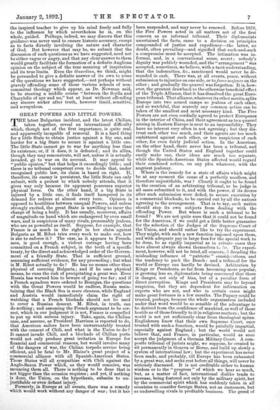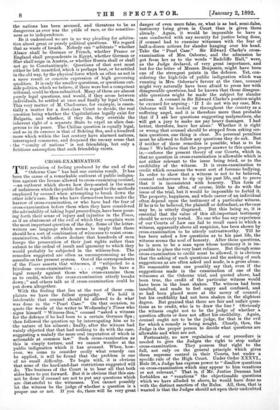GREAT POWERS AND LITTLE POWERS.
THElatest Bulgarian incident, and the latest Chilian, taken together, reveal an international difficulty which, though not of the first importance, is quite real, and apparently incapable of removal. It is a hard thing for a little State to obtain justice against a big one, and harder for a big State to secure it against a little one. The little State cannot go to war for anything less than its existence; or, if it does, it is defeated ; and its allies, though they may remonstrate, will not, unless it is actually invaded, go to war on its account. It may appeal to " public opinion," but that helps it exceedingly little ; and there is no tribunal competent even to decide that, under recognised public law, its claim is based on right. If, therefore, its enemy is persistent, the little State can only submit, with a protest to which nobody attends, that it gives way only because its opponent possesses superior physical force. On the other hand, if a big State is injured by a little one, it finds itself hampered in its demand for redress at almost every turn. Opinion is opposed to hostilities between unequal Powers, and unless strongly excited, the great State is unwilling to incur the charge of being a bully. It has usually, moreover, affairs of magnitude on hand which are endangered by even small wars, and is suspicious of many rivals, presumably jealous, who are as powerful as itself. Suppose, for example, that France is as much in the right in her claim against Bulgaria as M. Ribot tries every week to make out, how is she to enforce it ? The case, as it appears to French- men, is good enough, a violent outrage having been committed on a French subject, in the teeth of a specific treaty, by the direct and acknowledged order of the Govern- ment of a friendly State. That is sufficient ground, assuming sufficient evidence, for any proceeding ; but what is M. Ribot actually to do ? He has no means other than physical of coercing Bulgaria; and if he uses physical means, he runs the risk of precipitating a great war. Even Russia has warned him to beware of going too far ; and if a French squadron were ordered to Bourgas, the questions with the Great Powers would be endless, Russia main- taining that the Black Sea is mare elausum, while England and Austria would immediately claim the right of watching that a French blockade should not be used to cover a Russian descent. M. Ribot, in truth, can do nothing ; and assuming the French argument to be cor- rect, which in our judgment it is not, France is compelled to put up with serious injury. Take, again, the Chilian case, and assume, as President Harrison is reported to do, that American sailors have been unwarrantably treated with the consent of Chili, and what is the Union to do ? It cannot invade Chili, and a blockade of Chilian ports would not only produce great irritation in Europe for financial and commercial reasons, but would involve many of the dangers of war, the Chilian torpedo service being efficient, and be fatal to Mr. Blaine's great project of a • commercial alliance with all Spanish-American States. Those States will all sympathise with Chili against the Anglo-Saxon Power 'which, as they would conceive, was menacing them all. There is nothing to be done that is not bigger than the occasion requires ; and yet, if nothing is done, the Union, on the hypothesis, submits to un- justifiable or even defiant injury. Formerly, in Europe at all events, there was a remedy which would work without any danger of war; but it has been suspended, and may never be renewed. Before 1870, the Five Powers acted in all matters not of the first concern as an informal tribunal. Their diplomatists ascertained the facts, came to a decision on principles compounded of justice and expediency—the latter, no doubt, often prevailing—and signified that such-and-such a compromise must be accepted. The intimation was in- formal, and, in a conventional sense, secret ; nobody's dignity was publicly wounded, and the " arrangement " was accepted, sometimes, we believe, with a tacit understanding, that the indemnities, &c., sanctioned would never be de- manded in cash. There was, at all events, peace, without submission to injustice on one side, or to force ntaj eure on the other ; and gradually the quarrel was forgotten. It is, how- ever, the greatest drawback to the otherwise beneficial effect of the Triple Alliance, that it has dissolved the great Euro- pean tribunal. That alliance, whatever its other merits, splits Europe into two armed camps so jealous of each other, and so watchful, that scarcely any common action can be taken of the smallest and most necessary kind. The Five Powers are not even cordially agreed to protect Europeans in the interior of China, and their agreement as to a quarrel arising in Eastern Europe is next to an impossibility. They have no interest very often in not agreeing ; but they dis- trust each other too much, and their agents are too much embittered against each other, or too suspicious of each other, for even fairly judicial action. In the Americas, on the other hand, there never has been a tribunal, and though the United States and England together could easily make one, their ideas are much too separate, while the Spanish-American States affected would regard their combined action, on any plea whatever, with the angriest jealousy.
Where is the remedy for a state of affairs which might be at any moment the cause of a perfectly needless, and therefore unjustifiable, war ? Clearly it ought to be found in the creation of an arbitrating tribunal, to be judge in all cases submitted to it, and with the power, if its decree after such submission were defied, to secure execution by a commercial blockade, to be carried out by all the nations agreeing to the arrangement. That is to say, each nation should stop its own subjects from dealing with the offending Power. But where is such a tribunal to be found ? We are not quite sure that it could not be found for the Americas, if we could get a little better guarantee for the selection of the Judges of the Supreme Court of the Union, and should rather like to try the experiment. They might, with such a new function imposed upon them, and with adequate pay in large fees for the special work to be done, be as rigidly impartial as in private cases they have almost always shown themselves to be. The experi- ment, however, will not be tried, all concernol dreading the misleading influence of " patriotic " considerations, and the tendency to pack the Bench : and a tribunal for the world or Europe can hardly be devised. Arbitration by Kings or Presidents, so far from becoming more popular, is growing less so, diplomatists being convinced that there is danger, not only of bias, but of a peculiar form of direct corruption. Kings and Presidents may be beyond suspicion, but they are dependent for information on experts who are not and who in certain cases might make great fortunes in a few months. The Papacy could be trusted, perhaps, because the whole organisation included under that word would be so sensible of the advantage to be derived from the confidence of mankind, as well of those hostile as of those friendly to it in religious matters ; but the world is not yet sufficiently clear from theological spites. Englishmen know that their own Supreme Court, once trusted with such a function, would be painfully impartial, especially against England ; but the world would not believe that, and France, in particular, would as soon accept the judgment of a German Military Court. A com- posite tribunal of jurists might, we suppose, be created to sit permanently in Geneva or Berne, and build up slowly a system of international law; but the experiment has never been made, and probably, till Europe has been exhausted by a great war, and seeks rest before all things, will never be seriously discussed. It is not creditable either to human wisdom or to the " progress " of which we hear so much, but, as a matter of fact, international dislike tends to increase, being fostered not only by the military spirit, but by the commercial spirit which has suddenly taken in all countries to consider foreign States, not as customers, but as underselling rivals in profitable business. The greed of the nations has been aroused, and threatens to be as dangerous as ever was the pride of race, or the sensitive- ness as to independence. Be it understood we are in no way pleading for arbitra- tion about great or purely political questions. We regard that as waste of breath. Nobody can " arbitrate " whether Alsace shall be German or French, whether France or England shall preponderate in Egypt, whether German or Slav shall reign in Austria, or whether Russia shall or shall not go to Constantinople. Questions of that sort must either be left unsettled, which is perhaps best, or be settled in the old way, by the physical force which as often as not is a mere result or concrete expression of high governing qualities. It is only the smaller questions, or questions out- side politics, which we believe, if there were but a competent tribunal, could be thus submitted. Many of them are almost purely legal questions, and would, if they arose between individuals, be settled at once and finally by legal Courts. This very matter of M. Chadourne, for example, is essen- tially a matter for a first-class Court to decide, the real question being whether the Capitulations legally exist for Bulgaria, and whether, if they do, they override the inherent right of a separate State to expel an alien dan- gerous to its peace. The Chilian question is equally legal, .. and so in its essence is that of Behring Sea, and a hundred . more which within the last century have alarmed nations, interrupted commerce, and deepened the uneasy sense that the " comity of nations " is not friendship, but only a - fictitious assumption that such friendship exists.















































 Previous page
Previous page